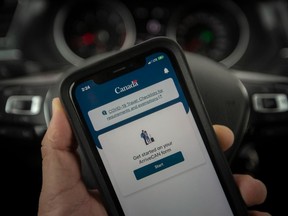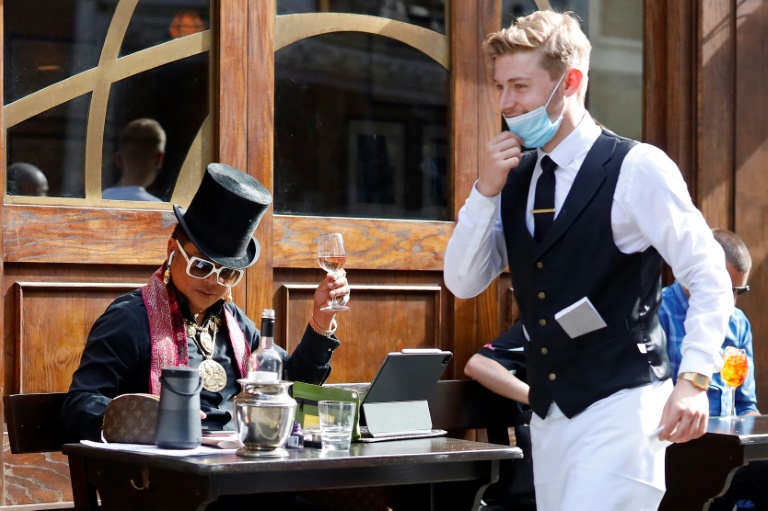The reports have not been made public, but Zinn confirmed that they were highly critical of both men
Article content
OTTAWA — A judge rejected a request by two federal officials to block an internal investigation into allegations they committed “serious misconduct” relating to government contracting and the ArriveCan app.
In a ruling dated Tuesday, Federal Court Justice Russel W. Zinn said applicants Antonio Utano and Cameron Macdonald, public service executives who worked at Canada Border Services Agency (CBSA) while ArriveCan was under development, turned to the court prematurely when they asked it to halt a government probe into allegations of “serious misconduct” raised by a Montreal-based company, Botler AI.
Advertisement 2
Article content
The ruling says Botler offered to share its findings about Utano and Macdonald to CBSA “in exchange for a contract.” Zinn wrote that the company provided the agency with the allegations the following month but does not specify if the government provided Botler with a contract in exchange.
At issue for Utano and Macdonald was a draft investigative report, called a “preliminary statement of facts” (PSF), written and then circulated within government by CBSA officials on the two men regarding allegations of contract wrongdoing while they worked at the border agency.
The reports have not been made public, but Zinn confirmed that they were highly critical of both men. In January, CBSA President Ein O’Gorman said it found “there was a pattern of persistent collaboration between certain officials and GCStrategies”, the firm at the centre of the ArriveCan scandal.
Recommended from Editorial
Utano and Macdonald described the allegations in their lawsuit as “spurious, scandalous” and replete with “unsubstantiated and untested” accusations.
Article content
Advertisement 3
Article content
Zinn wrote that once the PSFs were provided to Utano and Macdonald’s current employers, respectively the Canada Revenue Agency and Health Canada, both were suspended without pay and had their security clearances revoked.
“The PSFs have undoubtedly had a detrimental effect on the Applicants, as their dissemination to the Applicants’ employers directly led to them losing their security clearance and being suspended without pay. Having read the PSFs, I understand the Applicants’ concerns regarding their careers, reputations, dignity, and livelihoods as a result of their dissemination,” Zinn wrote.
Utano and Macdonald’s lawyer Christopher Spiteri told National Post they have since both had their pay reinstated but remain on medical leave.
So, in February, Utano and Macdonald asked the Federal Court to block CBSA’s investigation, declare that they were treated unfairly because they have yet to see the allegations advanced by Botler AI, and block any further spread of the PSFs. They also asked the court to order CBSA to delegate the investigation to a third-party investigator.
Advertisement 4
Article content
But Zinn ruled that the men turned to the court prematurely, ruling that they first should have filed a grievance against the PSF.
Furthermore, the judge noted that the reports are only preliminary and that CBSA’s investigation into Utano and Macdonald is ongoing and that no final decision on the allegations have been taken.
“There are no extraordinary circumstances before me that would warrant intervention at this stage of the proceedings,” Zinn wrote.
The judge also found there was no reason to block the government from further sharing the PSFs because Utano and Macdonald had likely already suffered the brunt of the consequences of its dissemination to both their bosses and the House of Commons government operations committee (OGGO).
“It is unclear what relief the injunction would offer the Applicants given that the PSFs have already been distributed to their employers and the OGGO. Any alleged harm flowing from the PSFs appears to have already significantly materialized,” Zinn wrote.
In an interview, Utano and Macdonald’s lawyer Christopher Spiteri said the ruling was ultimately a win for the two men because it confirmed their ability to grieve a draft investigation report.
Advertisement 5
Article content
He also said he was happy to see the court confirm that the investigation into his clients was directly linked to the Botler AI allegations, which he says CBSA has yet to release to his clients.
The Botler allegations are not linked to ArriveCan specifically but raise concerns that Macdonald directed the company to work with GC Strategies, an IT consulting firm at the heart of the ArriveCan scandal.
Utano and Macdonald have faced allegations of being overly cozy with certain private contractors, including GC Strategies. For example, they confirmed having participated in a virtual whisky tasting offered by a government contractor, but insisted all their contacts were disclosed to superiors.
Earlier this year, Auditor General Karen Hogan published a scathing report that found the cost of the application ballooned from $80,000 to potentially over $60 million. Part of the issue was a “glaring disregard” for “basic” procurement principles.
GC Strategies received nearly $20 million of that amount, which auditor general Karen Hogan said she could not confirm because the government’s bookkeeping for the project was the worst she’d ever seen.
cnardi@postmedia.com
National Post
Get even more deep-dive National Post political coverage and analysis in your inbox with the Political Hack newsletter, where Ottawa bureau chief Stuart Thomson and political analyst Tasha Kheiriddin get at what’s really going on behind the scenes on Parliament Hill every Wednesday and Friday, exclusively for subscribers. Sign up here.
Our website is the place for the latest breaking news, exclusive scoops, longreads and provocative commentary. Please bookmark nationalpost.com and sign up for our politics newsletter, First Reading, here.
Article content









